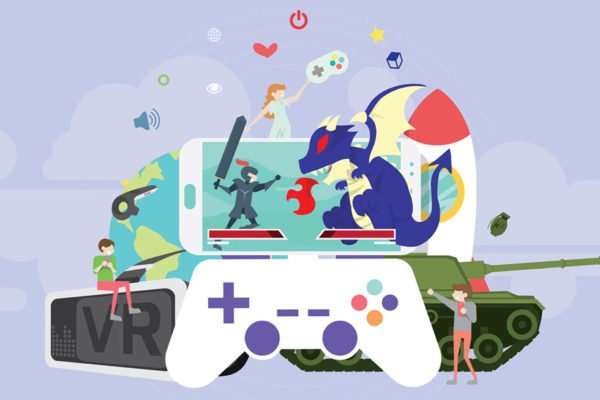Blockchain game developer
5 Reasons to use the Blockchain for your next game
August 19, 2019Articles, BlockchainNo Comments
The abilities of Blockchain technology aren’t just for cryptocurrency.
 Over the years, there’s been lots of talk about applying the same technology to other industries, such as banking, real estate, fundraising, and games. That being said, there’s still a lot of confusion as to what the benefits are of Blockchain as opposed to traditional networking and data management strategies. In this article, we’ll outline some key features of the Blockchain that show its potential as an invaluable resource for game developers.
Over the years, there’s been lots of talk about applying the same technology to other industries, such as banking, real estate, fundraising, and games. That being said, there’s still a lot of confusion as to what the benefits are of Blockchain as opposed to traditional networking and data management strategies. In this article, we’ll outline some key features of the Blockchain that show its potential as an invaluable resource for game developers.
Secure Your in-game Economy
Applying the principles of Blockchain technology ensures that every in-game currency or item cannot be abused by user exploits. Since every player has a copy of the information of a given item or currency once it’s created, this eliminates any potential for players to cheat their way through the economy that you’ve established for your game.
Using a Blockchain also creates an incentive for developers to have an in-game market for their items and currencies that doesn’t need any regulation from an external source. This becomes especially important when games like Fortnite become heavily plagued with black markets where people sell their items and accounts without any form of safety.
While we could easily quadruple the size of this article talking about all the possibilities the blockchain can open up to a games economy, we feel that the security and decentralization of it is by far the most impactful when considering how games implement economies today.
Streamline and Enhance the in-game Economy
Many existing Blockchain based games have actually implemented systems where players can transact with crypto or in-game currencies that have value in the real world. You can streamline your economy by paralleling an existing currency, leveraging existing wallet systems for transactions and monetization. You can also leave pricing up to the natural market for that currency. And what better way to attract and retain a player base than actually giving them a means to make a return on their investment?
Minimize Costs and Increase Redundancy
Today, publishers spend millions keeping servers running, storing terabytes of redundant data in clusters of servers worldwide. It cuts into margins, especially for games that don’t follow a paid subscription model. The blockchain keeps infrastructure costs to a minimum, offering the possibility of redundant, decentralized data right where your customers are, on their devices. As your customer-base grows, so does your infrastructure capacity, at no cost to you.
Players may also feel more inclined to purchase in-game items if they are set up as non-fungible tokens. Essentially making those items their own unique property, with the ability to resell or trade (from within the game or out). For example, the game Cryptokitties allows players to collect, breed, and trade their cats while the Blockchain ensures that anything the player creates is unique and unable to be replicated. One cat in particular sold for $170,000 in Ethereum.
Use Assets and Data Across Multiple Systems
You’ve set up your economy, player inventories, and collectables in the blockchain, and are seeing the benefits for the life of that game. How do you extend that return beyond that, to new platforms or the next game?
With a blockchain decentralized infrastructure, you could easily create web apps, such as online shops, trading marketplaces, and more to compliment your game. They would tap right into the same system, use and transact with those game elements, without any complex workarounds. It is a great solution to creating a suite of tools for a player to manage game content outside of the game.
This benefit is not just limited to web tools. You could just as easily use the very same currency and items in multiple games, leveraging those systems you set up for the first game for an ecosystem of games and tools, with minimal effort and virtually no additional infrastructure. This also eliminates the conundrum where players feel less inclined to play your a new game after they’ve spent so much time grinding and earning in the others.
Transparency Between Players and Developers
Since all players have a copy of the blockchain, they can see changes being made in real time. This ensures the utmost clarity between players and developers when it comes to things like monetization, balance tweaks, cheat-prevention, and other gameplay aspects as well. The blockchain acts as a virtual agreement between the two parties instead of traditional ULAS which can oftentimes be long to read and arduous to access at any given point in time. Additionally players can use the blockchain to opt out of any features the developer adds. With this feature, developers can receive real time information on what parts of their game players aren’t responding well to.
Hi! I am a robot. I just upvoted you! I found similar content that readers might be interested in:
https://workinman.com/5-reasons-to-use-the-blockchain-for-your-next-game/